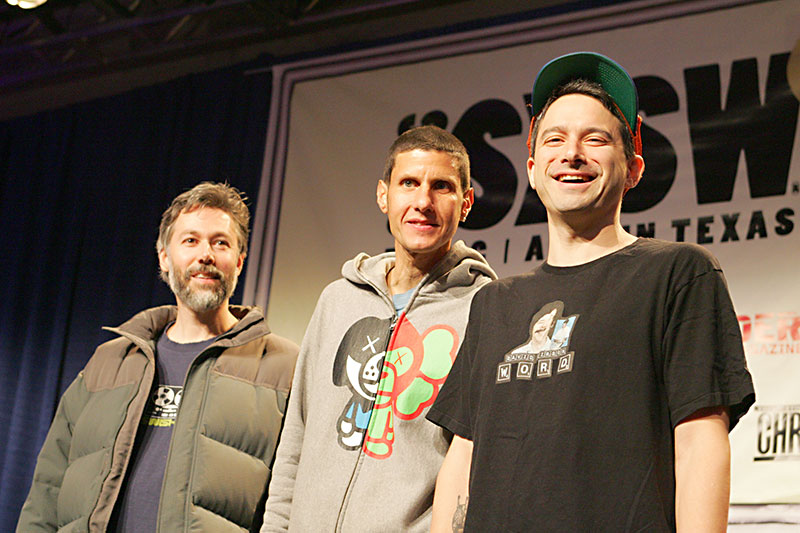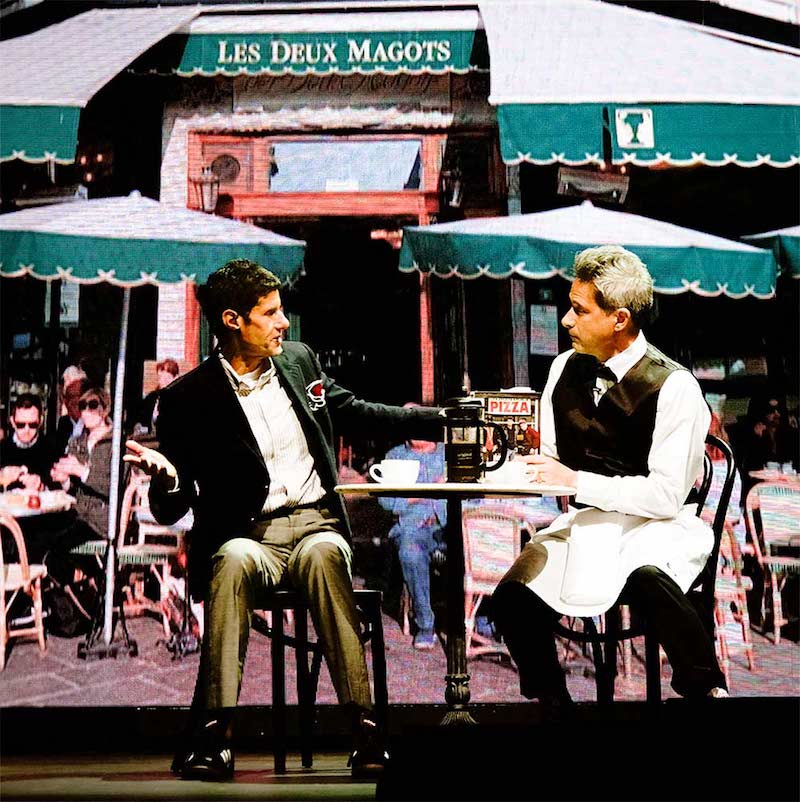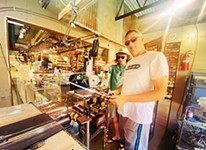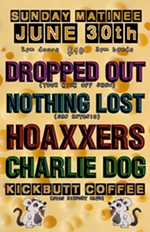Beastie Boys' Ad-Rock and Mike D Talk Trap, Basketball, Bogus Conspiracies, SXSW, and Their New Book
"We realized that all we do have, before this started and after it ends, is the three of us.”
By Kevin Curtin, Fri., March 15, 2019

By their own accounts, the Beastie Boys never spent much time considering their futures. Now that the relative future is here, they're thinking about the past. The seminal rap trio's new scrapbook/autobiography, October's Beastie Boys Book, released six years after the death of Adam "MCA" Yauch and subsequent disbanding, dives deep into their history.
The 571-pager, largely penned by Adam "Ad-Rock" Horovitz and Michael "Mike D" Diamond, flips through a ludicrously entertaining procession of stories, comics, mix-tape scans, recipes, and photos that amount to a Beastie Boys bible ... er, Torah. Highlights include profound perspective from original drummer Kate Schellenbach, an uproarious story in which Ad-Rock flips out on hash cookies minutes before a Dublin festival performance, continual extolling of Yauch's fascinating spirit, and remorse for the misogynistic gimmickry that preceded them being outspoken feminists.
The book's deep. This interview isn't. Happily, Ad-Rock and Mike D fielded our burning questions with the repartee that you expect from rap's greatest goofballs.
Austin Chronicle: All your albums have memorable titles – Check Your Head, Ill Communication, Hello Nasty – and yet this is simply called Beastie Boys Book. Why?
Ad-Rock: Because we thought about someone going to the bookstore and trying to remember some clever title that was like 18 words long and we figured, "Aye, you got that Beastie Boys book?"
Mike D: We could have called it The Inner Journey of Plants, but yeah, you would've just asked for the Beastie Boys book.
AC: Adam, in the book you come off as the Beasties' foremost stoner. South by Southwest boasts over 40 cannabis panels this year. Is that something that excites you, or does the mainstreamification of weed bum you out?
ADR: Does that mean there's going to be free pot? Because that might sway my answer.
AC: Probably not officially. Marijuana's still illegal in Texas.
ADR: When aspirin became widely available, were some people like, "Ah man, that's my shit! Now everybody's gonna know about aspirin!" I don't know, it's a plant. It's the healing of the nation, come on.
MD: I think it's gonna be the same as other plants. If you buy lettuce at CVS, you're getting stuff grown with hybridized seeds and dah-dah-dah, but if you want to get that kind lettuce, you go to the farmers' market. I think that'll be the future of weed: Some people will go to the farmers' market and know the person who grew it, and other people will go to CVS and buy pre-rolled joints. People value different things.
AC: You guys are extremely candid in your writings. Since the book came out, have you gotten any awkward texts from people who didn't like how they were characterized?
MD: No one's come gunning for us yet. Why? Who did we dis that bad?
AC: You didn't exactly name the A&R guy who worked Check Your Head, but the description of him was brutal. I'm actually thinking of Rick Rubin, who comes off sort of dictatorial.
MD: I certainly wondered what Rick Rubin would think because we went in a little hard, but you know, we were honest. And he seemed cool with it. He came to a [book] performance we did in the Los Angeles area.
AC: Your stories lend a deeper appreciation for how brilliant, ambitious, and unpredictable Adam Yauch was. He reminds me of the trickster deity from mythology – someone with a great degree of knowledge who uses it to disobey societal conventions for their own amusement. What would the book have been like if he were still around?
ADR: It would have been twice as long. It would have had lots of pop-ups and futuristic technologies.
MD: As all-encompassing as we tried to make the book, there would have been some way of integrating technology – like the part of the book that you get to and have to put on VR goggles.
AC: You're one of rap's great trios. America's current favorite rap trio is Migos. What do you think of them?
ADR: You know, I like Migos in that they're a newer rap group, because rap groups kinda faded away for a while.
MD: I get confused. I talk with my kids about this all the time: On Migos' records, it has the track and then it specifies "Offset," but it's like, "You're in the band!" Like, "Offset has a solo record now, wait until then!"
ADR: They also see the mainstreamness of rap and the monetary value of it in branding and all that stuff. Whereas back in our day, it was just the thing that you did.
AC: If the Beasties were still active, would you have made a trap song by now or collaborated with a trap artist?
ADR: Mike is actively involved in trap music ... in his nephew's house. Mike's really into a lot of hi-hats.
MD: I do harbor trap music at my house, that's true.
Where rap is at is always partially dictated by where the technology is. When we made License to Ill, we used physical tape loops. On Paul's Boutique, we worked with the Dust Brothers using the very first iteration of a mono sampler, but with computer software so we could sample the left and right sides and have a stereo sample. Now, everyone can use various plug-ins and effects on their vocals, and there's an ease to that. In the world of making music on a laptop, everyone is enabled.
– Mike D
ADR: One of the things that's interesting about rap music more than any other genre: It's constantly changing. The thing that's popular right now in rap music isn't the thing that was big in the Seventies.
In rock, it's like you have to listen to Led Zeppelin to make this music. That lineage is an ultra-important thing. That's not how it is in rap.
Whatever the new thing is, that's the important thing. That's what's happening now. That's cool.
In six months, it's gonna be different. Six months from then, it's gonna be different again.
AC: In 2006, the Beasties came to SXSW. You screened Awesome: I Fuckin' Shot That!, you did an audience Q&A, and you performed at Stubb's. What do you remember about that?
ADR: Oh shit. That was the Clear Channel/Scientology interview!
MD: Don't look at me like I'm going to bail you out of that.
ADR: Someone asked about Clear Channel owning all the venues and taking over ticketing and all this stuff, and how did we feel about that. I said, "Well, it's fucked up because, you know, the Church of Scientology!" The room went quiet and Adam and Mike were looking at me like, "Why are you doing this?" I said, "You know, Clear Channel, get clear, you know – Scientology. My friend Chuck told me." And then the moderator was like, "Okay, that's all the time we have. Thanks Beastie Boys."
MD: Then we leave and it was that uncomfortable thing in the room like, "Oh boy, these guys maybe smoked a little too much before the panel."
AC: Did any Scientology/Clear Channel operatives come knocking on your hotel room door that night?
ADR: Well, I looked it up, and after doing some research, they are not linked. I was dead wrong.
AC: What's your earliest memory of the Beastie Boys coming to Austin?
ADR: Good question. We've been there so many times, but I can't remember any of the early shows.
MD: I know in [2004] we were really excited because we played in the arena where Texas plays basketball. We got to use the practice court and the guy gave us Longhorn basketball paraphernalia. That's a big deal when you're on tour and that's the thing you do for fun: play basketball. And they're like, "Here, you can use this beautiful facility and here's a basketball jersey."
ADR: Oh yeah! And Yauch wore his Longhorns basketball shorts for years.
MD: That's true. He did play basketball in those for years!
AC: Which of the Beastie Boys is the best basketball player?
MD: I'm going to give a complicated analysis on that. Adam Horovitz has the most qualified background, okay? He attended prestigious basketball camps, and he brings a certain amount of game IQ. Yauch and I weren't coached. Yauch was the loose cannon with the unorthodox style in that he was gonna be on or off, but in clutch times, he could get those buckets.
ADR: Basically, Yauch was terrible at basketball, but he was the only one of the three of us that could actually make shots – and he was a good shot consistently. Mike? Pretty bad, but he's a locker room guy.
MD: Work ethic!
ADR: Mike was the best rebounder in the band. He knew how to box out, he knew his spacing. I knew how to dribble and pass ... and miss shots.
MD: What about my court vision, Adam; you didn't talk about that at all?
ADR: Terrible. Mike always does the thing were he passes it too close, too fast.
AC: This book is the first major release to come out in the Beastie Boys' afterlife, where interest in the band remains high. Do you look at yourself as executors of this estate, and is there a moral obligation to release archived material?
MD: We look at it a little more personally. The book is part of it and so are these [book tour] shows that we've done. We just feel lucky. We're just these friends from New York City that experienced all this stuff that inspired us to make what we made. Not only that, but we got to keep doing that for decades, and over those decades we actually got to change. That means making mistakes, and now we get to actually comment on all of that. We get to talk about what was exciting about all of that and also call ourselves out for being idiots numerous times.
AC: That reminds me of what I thought would've been a good title for the book: It Seemed Funny at the Time.
MD: See! Where were you? Actually you're right.
ADR: We had the idea to do a companion book called Funny to Us, because there were so many things that we cut out of the book because they were only funny to us.
MD: But you're right in terms of Seemed Funny at the Time. That's the story of what you do as a band. People always ask, "Well what's your favorite record?" or "Why did you do this?" Really, the records we made and the things we did were always where we were at, at the time.
ADR: It's also like, you do dumb shit with your friends at different stages of life, but we happened to be a band, so the dumb shit we did happened to incorporate our band. Some of that shit ... yeah, it just seemed funny at the time.
AC: Y'all are looked at in popular culture as three truly great friends and the book confirms that to the nth degree, where you're hanging out all day and then calling each other at night. Do you guys have any secrets for having great, lasting friendships and not letting shit come between you?
MD: Well, first off, we do teach that course. Our next seminar is going to be in Norway and – I think it's a very reasonable fee – it's €39,000. The seminar's called "Hugs." You can learn our secrets to long-lasting friendships.
No, for real though, we talk about it all the time. It's not like it was easy, but we're not even sure what it was that gave us the ability to stay so connected. We knew each other literally since we were kids, and the fact that we got to stay friends through everything – money that you think you have and then you don't have, success that you have and then don't, everybody taking credit for different things and you don't know who to believe – was incredible. At a certain point pretty early on, enough crazy stuff had already happened that we realized that all we do have, before this started and after it ends, is the three of us.
AC: Why do you think that none of you guys, at the most opportune moment, said: "Time for my solo album."
ADR: We were trying to make Mike go solo, but he wouldn't do it!
MD: No, tell the truth, Adam. You guys were holding me back! I could be like Offset right now, but we had a clause in our contract: the "no-solo" clause.
ADR: You actually don't want to hear one of us for an hour on a record.
MD: I think it's hard enough to hear the three of us.
ADR: Us three is one thing, but just one of us? It's a little much.
AC: So you're saying "lack of exceptional talent" is the reason?
MD: I could have had a lot of collabos. Every rapper wants to be on my record.
ADR: But that's glaring, Mike. All the reviews and the critics have been like, "Once again, Mike D outshines his collaborators."
AC: Did you ever meet fellow famous New Yorker Donald Trump?
MD: I didn't meet him, but I was in an elevator with him at a Knicks game. At Madison Square Garden, we have the good fortune of having played that building a number of times, so we have [fakes proper English accent] VIP status, and I've had to take the special VIP elevator with Donald Trump.
ADR: I haven't ridden that elevator with Donald Trump, but I have ridden that elevator with Matthew Modine ... and Drake, actually.
MD: Oh, I sat right behind Drake at a Knicks game when my kids were a lot smaller. I know it's a free country, but Drake was drinking a lot of vodka-cranberries at the game and I had to explain that to the kids. They were like, "Dad, Drake's ordering a lot of drinks!"
ADR: It's official: Drake's a bad role model. Drake the Drunk – that's the headline. Hey, I'm not going to say that Clear Channel shit when I'm here this time.
AC: You know Alex Jones is from Austin, so you better come up with some stronger conspiracy shit than that.
ADR: OK, I'll work on it over the next couple days.
Music keynotes Adam Horovitz and Michael Diamond will be interviewed by Amazon Music’s Nathan Brackett on Fri. 15 at the Austin Convention Center Ballroom D, 11am.











